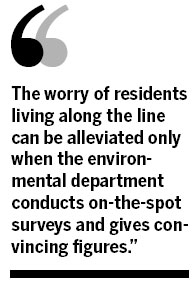Voices
Concerns about the benefits of Maglev rail
(China Daily)
Updated: 2010-05-26 07:49
 |
Large Medium Small |
The controversial Maglev train project finally got its green light in Beijing.
The environmental assessment report of the Line S1 was publicized to solicit public opinion. Accompanying the report, however, is the timetable of the project. So the public cannot but question whether the authorities really care about what the public thinks.
In fact, residents along the planned line, worrying about the possible harm from radiation and noise, have already lodged a joint protest.
The Maglev train in Shanghai, put into operation in 2002, was the world's first Maglev in commercial operation. The 30-km line, with a gigantic cost of 10 billion yuan, is now deeply in deficit. Because of the high ticket prices, the annual passenger flow is only 20 percent of capacity.

Another Maglev train project, with a budget of 35 billion yuan, was canceled in Shanghai for fear of potential pollution.
Shanghai's Maglev should provide food for thought for any potential follower. Behind the advantages of Maglev - comfort, modern styling and efficiency, some questions should be answered.
First, does it harm the environment? How big is the impact of Maglev pollution? Such a question should be answered with concrete figures instead of empty talk. The worry of residents living along the line can be alleviated only when the environmental department conducts on-the-spot surveys and gives convincing figures.
Second, is it safe? Maglev has many more technical requirements than traditional rail. Its smooth operation, for example, depends on the stability of electric pressure. Can all the technical requirements be guaranteed?
Third, is it efficient? What is the budget of the planned project? It is reported that the planned S1 line has a low- and medium-speed, requiring a much smaller investment compared with the high-speed one in Shanghai. Still, the investment is by no means a small sum. It is known that Maglev trains have a high energy consumption and high maintenance costs. How much of that fee will future passengers shoulder for them?
Fourth, how many benefits will it bring to local residents?
What is the real purpose of building a Maglev line, to improve traffic or boost domestic consumption? Is it for social or economic benefit? If it really aims to improve traffic, will the fare be affordable to residents?
Furthermore, is it a must? Is there any other choice with a lower investment but mature and stable technology?
An assessment could not be deemed just and scientific if it fails to answer the above questions. The answers will make clear whether the project is for show or for the welfare of residents.
Excerpts from a comment that appeared in Beijing Times on May 25